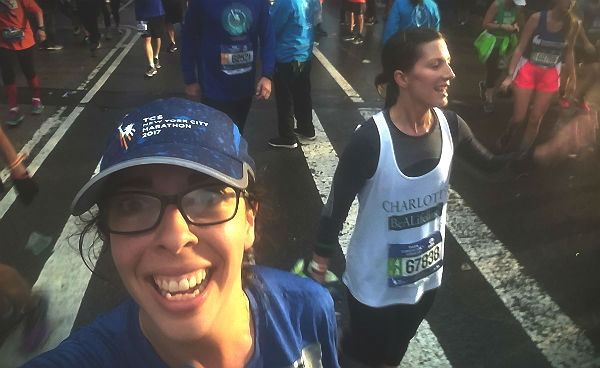
The author (left) just after crossing the 2017 New York City Marathon finish line
Editors’ Note: The following post by Albert Einstein College of Medicine fourth-year medical student Shoshana Weiner was first published in the blog, Reflective MedEd.
“4 ounces water every mile, half an electrolyte ‘gu’ pack over 2.5 miles, ¼ energy bar every 6 miles”—AKA how did you manage training for a marathon while in medical school? The simple truth: I decided to run a marathon, so I did. Longer story: months of rigorous training, more moments of doubt than I care to recall, and insights already positively impacting my medical training.
Training for and running a marathon is a time-intensive commitment of physical and mental endurance. Age-old lessons of “you can accomplish anything you set your mind to; hard work pays off” hold true and gained new meaning for me.
My first lesson came from an unexpected place—a surgeon known for passionate focus and commitment to quality. During my surgery clerkship, I watched with awe as she meticulously repaired an abdominal birth defect in a tiny baby. Afterward, I heard her telling the surgical resident about her long distance cycling during a recent vacation. With the slight hesitation of a medical student, I mentioned I’d recently registered for the upcoming NYC marathon. She turned to me, and with a twinkle in her eye revealed she had run the NYC marathon many times, and was again registered for the race. “Got any advice?” I asked. “You’ll learn to understand the way a human body works better than any physician could teach you,” she replied. “It’s similar to doing a critical care fellowship! As you train, the physiologic needs and metabolic demands of your body will become crystal clear—you’ll learn fundamentals of hydration, electrolyte balance, carbohydrate needs, and thermoregulation.” In other words, take heed, respect the body, learn, and enjoy. Words of wisdom for both professional and personal wellbeing.
I gained additional wisdom along the course to the finish line. I learned about my drive to succeed, and how to accomplish new feats. I learned how my mind fights back when it wants to stop, and how to access the part that wants to endure. Grueling early morning training runs taught me not only to treat my body with respect by sleeping, eating, and hydrating as best possible, but also to nurture my mind. I could control my outlook by accessing certain thoughts and emotions. Positive self-talk was my own internal cheerleader. I connected to peers who provided encouragement and supported fundraising efforts and even joined me on training runs. Reflecting on lessons learned has fostered mindful self-awareness and perhaps better equipped me to face life’s challenges on the wards and beyond.
Not everyone has to run a marathon, but taking care of ourselves within the high paced, goal-driven world of medical education and practice is crucial for our wellbeing and for quality patient care.
On marathon day, I hit the allegorical “wall” earlier than expected, at mile 17. With knee pain and 9 miles remaining, my mind shut down. I experienced anger mixed with exhaustion and a strong desire to stop. It was then that I saw a man with one leg completing the course on crutches. Something in me sparked back into gear as I was reminded of the ability of humans to endure, inspire, and fight on with courage. Harnessing these thoughts to block out the pain, I pushed towards the finish line.
In 26.2 miles I learned how to accomplish a goal. The experience is now part of my identity and I hope to wear it well. As I look forward to residency training, I face the daunting prospect of long hours, academic rigors, and pressures of high-stakes decision-making. A marathon. More than 26.2 miles. I think I’m ready.

